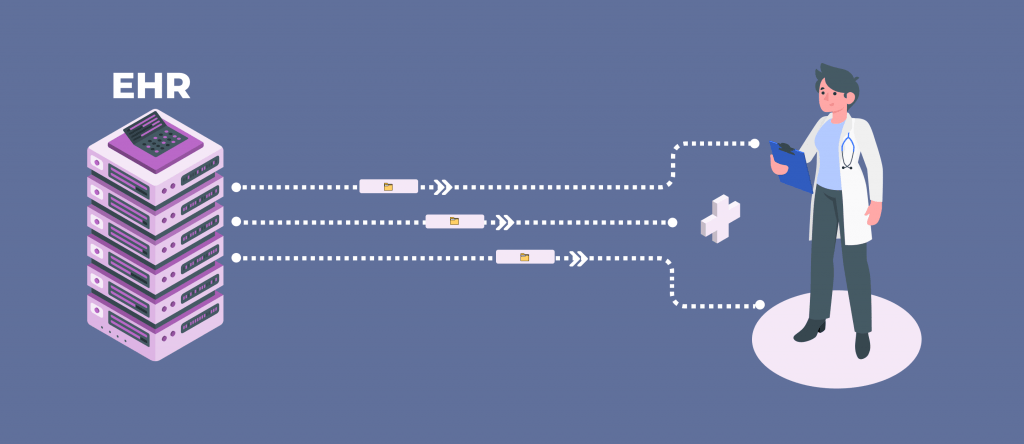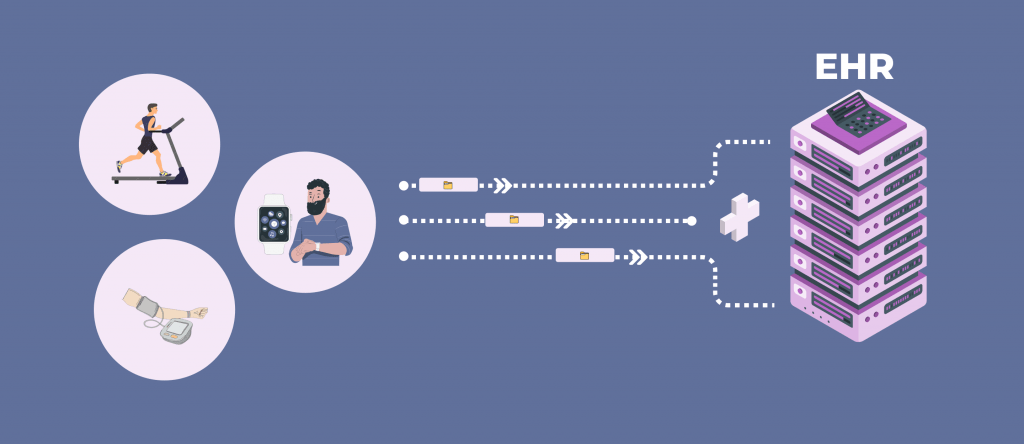What is Aggregate Data in Healthcare?
Aggregate data in healthcare is the process of combining different types of health data from different source/channels into a single, system. And is constructed upon individual patient data, sourced primarily from two key channels.
Firstly, through a patient’s Electronic Healthcare Record (EHR), personal information including name, age, weight, medical history, diagnoses, treatments, genetic data, and family medical history is constantly updated each time a patient engages with healthcare professionals.

Secondly, some recent technological advancements have ushered in the era of wearables, encompassing devices like fitness trackers, smartwatches, and safety tools. These wearables capture and store vital health data such as sleep patterns, activity levels, and location details.

By consolidating vast amounts of pertinent, de-identified individual patient data, experts can construct comprehensive models utilizing healthcare data analytics solutions, representing entire patient populations. This enables the extraction of innovative insights, leading to more efficient treatment methodologies.
The end goal is to make the healthcare data more accessible for analysts, healthcare professionals, etc.
Advantages of Healthcare Data Aggregation: Revolutionizing Medical Practice
In today’s healthcare discourse, the integration of healthcare data commands the attention of medical professionals and healthcare providers alike. To delve deeper into the realm of healthcare data aggregation, let’s explore the multifaceted ways in which data sharing is reshaping the healthcare sector:
1. Fostering Trust Through Reliable Data:
The credibility of data is directly proportional to its scale. A survey encompassing thousands of individuals provides far more dependable results than one involving only a handful. Increasing the sample size augments the data’s quality, instilling trust in its accuracy and authenticity.
2. Fueling Advanced Healthcare Products:
Quality data translates into superior knowledge, driving advanced product development. Robust and reliable data empowers developers to create solutions tailored to the diverse needs of a larger populace. Moreover, analyzing demand and supply statistics ensures these products meet market requirements effectively.
3. Empowering Precise Trend Analysis:
A comprehensive database of patients with similar ailments equips medical professionals to administer precise treatments. Monitoring healthcare trends enables doctors to anticipate potential diagnoses, enabling proactive approaches to emerging healthcare challenges.
4. Upholding Reliability and Transparency:
Transparency serves as the cornerstone of trust. When transparency extends across developers, healthcare providers, pharmaceutical professionals, and patients, it nurtures enduring trust between the healthcare system and its patrons. Transparent practices enhance the credibility of the entire healthcare ecosystem.
5. Precision Healthcare Through Aggregate Data:
Aggregate data offers a holistic view of healthcare scenarios, enabling well-informed decisions. By scrutinizing extensive datasets, healthcare professionals can identify resource gaps, leading to enhanced policy-making and administrative strategies.
6. Real-time Insights and Proactive Solutions:
At the individual level, healthcare practitioners employ aggregate data to create predictive models for real-time patient outcomes. On a larger scale, experts gain insights into upcoming waves of illnesses, identifying the most effective treatment avenues by closely monitoring population patterns.
7. Tailored Patient-Centric Approaches:
Acknowledging the diversity of patient needs is pivotal. Data aggregation in healthcare empowers medical professionals to customize treatments, transitioning healthcare from a one-size-fits-all approach to highly personalized, patient-centric care.
Recognizing the critical significance of this data, its judicious utilization becomes paramount. Efficient utilization not only ensures the data’s brilliance but also plays a pivotal role in positively transforming the American medical sector.
Preserving Patient Privacy through Patient Data Aggregation
Since the early 2000s, a cultural shift towards data sharing has been discernible, mirroring trends in social media. In the medical arena, this shift prompts a delicate balance between individual privacy and the scientific opportunities vital for saving lives. Fortunately, aggregate data emerges as a pivotal solution, effectively safeguarding privacy while harnessing the potential of Big Data analytics.
This evolution proves advantageous for patients, physicians, insurance providers, and public health organizations alike.
The Future Landscape of Aggregate Data in Healthcare
The landscape of healthcare delivery is undergoing a profound transformation, propelled by the force of Big Data. Much like the innovations introduced by platforms such as Uber and Airbnb, healthcare is embracing a decentralized future. Algorithms, not just doctors, will discern early signs of diseases, aiding physicians in prescribing treatments tailored to individual patients.
This data will be cross-referenced with genetic information, empowering individuals to make fully informed decisions regarding their health. In our post-pandemic world, aggregate data is already proving instrumental in pinpointing outbreak hotspots and curbing the spread of diseases. Although intricate, comprehending population data is pivotal in enhancing and optimizing healthcare delivery systems, ensuring a healthier future for all.
We can help you in this journey forward. Our experience and expertise in the intricacies of the US healthcare industry have enabled us to garner much trust from our clients. Connect with us at info@nalashaa.com as your first step to the future.
Mitrajit Das
Latest posts by Mitrajit Das (see all)
- Revolutionizing Healthcare Communication: The AIDET Approach - March 17, 2025